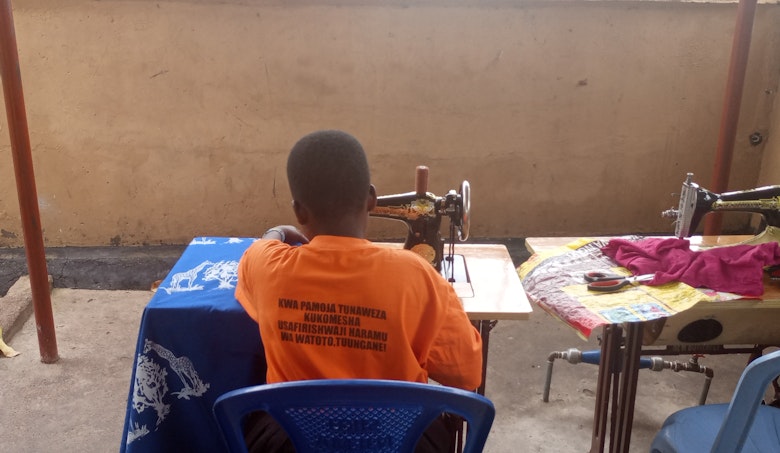A safe Haven for Kamoli
Kamoli,15, grew up in Ukerewe district in Tanzania with her single mother. The family faced hardships which ultimately resulted in Kamoli working as a domestic worker, facing exploitation and abuse from her employer. With our support, she was taken to a shelter, a safe haven, and was reunified with her family.
Last resort
Kamoli lived well with her mother, a small-scale farmer. Unfortunately in 2021, her income was not enough to sustain the family and Kamoli had no choice but to drop out of school. Life became unbearable prompting Kamoli’s mother to resort to look for work for her as a way to complement the family's income. On that day, she arranged for Kamoli to travel to her new workplace in Mwanza, not knowing how her fate would change for the worse.
Her mother met with the mother of her soon-to-be employer who organised for the transport to Mwanza. Upon reaching her employer´s house, she was welcomed with open arms. She showered, ate and went to sleep comfortably. The next morning, she started working around the house; cooking, doing laundry, cleaning the house, and babysitting her employer’s two young boys.
Hardship
As the days went by, life became really tough for Kamoli at the hands of her new employer. Any time she woke up late, she would receive a thorough beating. Other times, her employer would wake up with bad moods, quarrel and hurl insults at Kamoli. More often than not, she would beat Kamoli severely and did not pay her at all the work she did. She was never given a phone to contact her mother directly and she was also warned against interacting with neighbours or playing with other children. This went on for more than six months and Kamoli could not take it anymore
Fleeing
On one early morning, Kamoli finally got the courage to ask her boss for her salary. She completely refused to pay her and instead decided to send Kamoli back home. She gave her 18.9 Euros and took her to a bus conductor. She slept at the passengers´ waiting building but with the help of a good samaritan she boarded a public service vehicle that took her to the port and she boarded a ferry back home. While enroute, she interacted with one passenger who advised her to report her case to the police so that she can get her wages.
Reporting
Upon arriving at Ukerewe island, Kamoli reported herself to the nearest police station where she explained her exploitative situation to the police man on duty. “I was overworked, with a promise of a low payment which I never received and my employer was abusing me physically and psychologically.¨ She explained.
Her legal case was opened and investigations launched against her employer. The police gender and children desk linked Kamoli with the Ukerewe district social welfare officer who registered and admitted the girl to the KIWOHEDE shelter.
Safe Haven
For about three months, Kamoli felt that she was in a safe haven in the shelter. She was provided with basic needs such as food, clothes, dignity kits, legal aid, received medical checkup and counselling support. Additionally, she was provided with legal advice by the project’s legal officer, trained on handicraft skills including mat weaving and beading and other life skills including basic sewing, hair styling and plating.
Our partner, Kiwohede traced her family and she was very happy to be reunited with them. “I am very grateful to KIWOHEDE/TdH NL, the police and other government officials who helped me with my freedom and new awareness.¨
I am now able to weave mats, make beads, plait and style hair, express myself, interact and play with my fellow children.” Kamoli gleefully stated. In future, I would like to empower other girls who were denied education rights and forced into child labor.”

